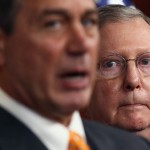How the Funding Fight Could Hurt the GOP
 Tea partiers and talk radio are urging the GOP towards another government shutdown. But what voters really care about are jobs, not the deficit.
Tea partiers and talk radio are urging the GOP towards another government shutdown. But what voters really care about are jobs, not the deficit.
It’s déjà vu all over again. 15 years ago the Gingrich Revolution fizzled out almost immediately after it started because the budget-cutting zeal of many Republicans caused a disastrous government shutdown. This time, Republican concern for deficits seems less sincere than 1994: otherwise they might be more cautious about renewing all the Bush tax cuts. But already we can hear conservative voices in talk radio – including Rush Limbaugh’s – urging Republicans toward another shutdown. This time, the confrontation seems to be a confrontation for its own sake.
Some perspective here: when Barack Obama was elected two years ago (on the platform of “spreading the wealth around”!) was there anybody who thought that at the end of his term the top marginal rate would still be 35%?! Yet this is precisely what’s about to happen. And Republicans had to give up ridiculously little in return. Yet somehow, some of them are still not satisfied. The “temporary vs. permanent tax cuts” argument is just plain ridiculous. There’s nothing “permanent” in politics. Prohibition was enacted by a constitutional amendment, yet it still was repealed in a matter of months. And taxes can be raised much faster. If Obama is reelected and the Dems take back the House, they can do whatever they want with tax rates. So the “permanent” tax cuts would probably last for just two years – exactly as long as the “temporary” tax cuts are going to last under the deal. Furthermore, “permanent” tax cuts might well be followed by a larger tax increase than “temporary” cuts. As things stand now, in two years the Democrats will have a choice: to enact a politically damaging tax increase – or do nothing and see the top tax rate go up 4.6% anyway. If the tax cuts were made “permanent”, the choice would be to enact a politically damaging tax increase – or do nothing and keep the current 35% rate. If the latter is deemed completely unacceptable (and it will be!), then the political damage is hardly higher from raising taxes by, say, 10% than by 4.6%, so why would we expect the Dems to stop at 39.6%?
The deficit objection is somewhat more serious. But it is still not justified for at least two reasons.
(1) The deficit is not a problem in and of itself, it’s just a symptom. The US public finances are indeed unhealthy. The single biggest cause of the negative long term fiscal outlook is the fact that the government at all levels (let’s not kid ourselves: the federal government is on the hook for debt obligations of the states) gave rather generous promises to future retirees and even more generous (in some cases even truly extravagant) promises to future government retirees. This problem (along with some other problems) is further exacerbated by skyrocketing medical costs. Rejection of the tax cut deal does not address any of these structural issues (and the deal covers only the next two years anyway).
(2) The deficit may be a huge concern of the Tea Party but it’s not the biggest concern of the average voter. What people really care about is jobs. Of course, unemployment is also just a symptom. The real underlying problem is the bad economy. Once we have robust economic growth, the jobs problem will be solved and the deficit problem will be mitigated. Conversely, we are just not going to solve the deficit problem in a sluggish economy. So what conservatives need to do is to promote economic growth and keep reminding the voters that it’s the best (and the only) way to address their concerns about jobs.
It would be dangerous for conservatives to think that high unemployment only hurts the Democrats now. Besides the fact that Republicans will share the responsibility for governing in the next two years (and, in the minds of many voters, were responsible for the whole crisis to begin with), high unemployment per se does not always doom the incumbent president. FDR kept getting reelected despite very high unemployment. Just like FDR, Obama undoubtedly inherited a bad economic crisis from his predecessor, so the voters may not necessarily hold him responsible. Furthermore, our current irrational health care system is employment based, and as more and more people fear losing their coverage (or actually lose it), and when in a few short months a lot of chronically unemployed people start losing even their very expensive COBRA coverage, the popularity of Obamacare may start increasing (just in time for futile Republican attempts to repeal it). So in this sense high unemployment may be worse news for Republicans than for Democrats.
Of course, there’s an important difference between FDR and Obama so far. FDR always seemed to care about high unemployment and to try to alleviate it. Obama instead spent the first half of his term focusing on his pre-existing priorities which either had little or nothing do with jobs (such as health care, Don’t Ask, Don’t Tell and closing Guantanamo) or were even counterproductive (such as global warming and immigration). That was in fact a major reason for the midterm “shellacking”. However the (very) short list of Obama’s demands in the tax deal suggest that in the second half of his term he may indeed intend to focus on voters’ concerns about jobs. The Republicans would be very ill-advised to leave that field to him and focus on their pre-existing priorities, such as Obamacare repeal and the deficit obsession.